Rectifying NTA Exams Disaster
Reports of widespread cheating, favouritism and swindles in NEET-UG 2024 have generated the first storm of the new Parliament convened on June 24. That’s bad news for the weakened BJP/NDA 3.0 government, and especially for re-inducted Union education minister Dharmendra Pradhan – writes Summiya Yasmeen
With evidence emerging on a daily basis that there was widespread cheating and bribery in the NEET-UG (National Eligibility-cum-Entrance-Test-Undergraduate) 2024 examination written by 2.4 million school-leavers aspiring for admission into medical colleges countrywide, the newly sworn-in BJP/Modi government at the Centre has got off to a shaky start. Coincidently results of NEET-UG — a centralised national exam for aspirant medical practitioners introduced in 2016 — were announced on the very day (June 4) that General Election 2024 results were declared by the Election Commission of India.
In the recently concluded General Election, upending all expectation and opinion poll forecasts, the ruling BJP was cut to size with its 303 seats in the Lok Sabha reduced to 240. Although together with its NDA (National Democratic Alliance) allies it bagged 293 seats in the 543-strong Lok Sabha, the BJP with prime minister Narendra Modi at the helm has formed the BJP/NDA 3.0 government at the Centre, reports of widespread cheating, question paper leaks and swindles in NEET-UG 2024 have generated the first storm of the new Parliament convened on June 24. That’s bad news for the weakened BJP/NDA government and especially for Union education minister Dharmendra Pradhan, who has been re-inducted into Shastri Bhavan, Delhi.
The embarrassment suffered by the new BJP/NDA government at the Centre is likely to be serious because the decision to replace medical college entrance exams hitherto administered by state governments with a common national exam — (NEET-UG) — for admission into all 706 medical colleges countrywide was of the BJP/NDA 2.0 government in 2016. The rationale of NEET-UG advanced at the time — endorsed by the Supreme Court — was that it saves students the expense, time and inconvenience of having to write multiple entrance exams of state governments in the hope of bagging a prized seat in a highly-subsidised government-promoted medical college. In 2017, a National Testing Agency (NTA) was established to conduct NEET-UG and several other national entrance exams including IIT-JEE, UGC-NET among others.
However according to some educationists, NTA was established hurriedly without due care and diligence to create well-paid “jobs for the boys”, i.e, ideologically aligned party sympathisers. This is substantiated by NTA suffering embarrassment ab initio for glitches while conducting national examinations written by thousands of students clamouring for admission into the country’s much-too-few acceptable quality higher education institutions.
In NEET-UG 2020 it incorrectly declared a student in Madhya Pradesh had scored only 6 marks in the exam, an egregious error that drove her to suicide. Later, NTA issued a clarification that she had scored 590, provoking a huge public outcry. In 2022, NTA was widely criticised for mismanagement of the IIT-JEE (Main) 2022 examination during which “technical issues” resulted in abnormally low scores for many students. The agency also drew heavy flak for bungling the inaugural Common University Entrance Test (CUET) introduced in 2022 for admission into the country’s 56 Central government universities.
However this time round, the scale of NTA’s mismanagement of NEET-UG 2024 in which 2.4 million students competed for a mere 1 lakh medical college seats is unprecedented. For the first time, 67 school-leavers scored a perfect 720 (cf. two in 2023) with several thousand awarded distinction scores of 650-720.
This steep grades inflation and consequent high cut-offs stipulated by 706 medical colleges countrywide have dashed the hopes of several thousand teens of qualifying as medical practitioners. Moreover, following extensive public protests over unprecedented grades inflation, NTA disclosed that 1,563 examinees (including 44 of the 67 perfect scorers) had been awarded “grace marks” to compensate for “loss of time” complaints during the single national pen-and-paper test held on May 5.
Unsurprisingly, dozens of writ petitions have been filed in the Supreme Court by students and coaching institutes demanding a thorough and independent investigation of NTA’s mismanagement of NEET-UG 2024. In particular the media and independent investigators have highlighted that grace marks had been awarded only to students who wrote NEET-UG in six centres in Delhi, Haryana and Chattisgarh whereas the exam was written in 4,750 centres in 29 states and seven Union territories. Even as this puzzle was being deciphered, whistleblowers on social media reported a NEET exam paper FIR (first information report) filed in Bihar and a police complaint against ‘centre fixing’ filed in Godhra, Gujarat.
On June 13 the NEET-UG entrance exam mess became messier. NTA informed the Supreme Court that it has cancelled the grace marks awarded to 1,563 candidates and offered them a re-test option on June 23. While accepting NTA’s decision, the two-judge bench rapped the agency for violating the “sanctity” of the exam and recommended stringent punishment “even if there is 0.001 percent negligence on the part of anyone”. However, the apex court declined to cancel NEET-UG 2024 and/or postpone the admission counseling and seat allotment processes scheduled to start on July 6, while adjourning hearing petitions to July 8.
Medical education qualifications are highly prized by India’s influential 200 million-strong middle class which dominates industry, academia, government and legal profession. They guarantee high income and social status in a society in which the doctor-population ratio is a lopsided 0.7 per 1,000 (cf. the WHO recommended 1:1,000), and are also passports to lucrative assignments and practice abroad. Therefore, parents often make great financial sacrifices to enroll teenage school-leavers in specialised test prep centres — a massive Rs.58,000 crore annual revenue industry — to drill and skill students to top NEET-UG and qualify for admission into government medical colleges which provide medical education at over-subsidised prices.
For instance, highest ranked students eligible for admission into the country’s 19 AIIMS (All India Institute of Medical Sciences) colleges pay annual tuition of a mere Rs.1,000-17,500 per year. In other government medical colleges, fees range between Rs.5,000-55,000 per year (for five years). In the 317 private medical colleges, officially approved tuition ranges between Rs.10-25 lakh per year. And students admitted into the discretionary ‘management’ quota of private medical colleges have to fork out Rs.15-32 lakh per year. Therefore there’s a frenzied annual race for the 56,300 seats in 389 government colleges to study for a medical degree at rock-bottom prices with toppers admitted into the best equipped AIIMS colleges paying (tuition and residence) a mere Rs.1,00-1,500 per month.
With the stakes so high and the NEET-UG 2024 fiasco making front page headlines in print, television and social media, and a newly-strengthened Opposition led by the rejuvenated Congress Party cornering the less than month-old BJP-led NDA 3.0 government, education minister Dharmendra Pradhan experienced a second baptism by fire. Initially he refused to admit any irregularity in the “motivated” NEET-UG 2024 controversy. But subsequently he has been forced to backtrack, promising that NTA and other officials involved in paper leakage and marks manipulation would receive the “harshest punishment”.
Moreover on June 20, after the education ministry ordered cancellation of the UGC-NET — an exam conducted twice annually by the NTA to determine the eligibility of candidates for the positions of assistant professor and Ph D admissions — following reports that the exam paper had leaked on the dark net, a visibly chastened Pradhan called a press conference and took “full moral responsibility” for the NEET-UG debacle and UGC-NET exam cancellation.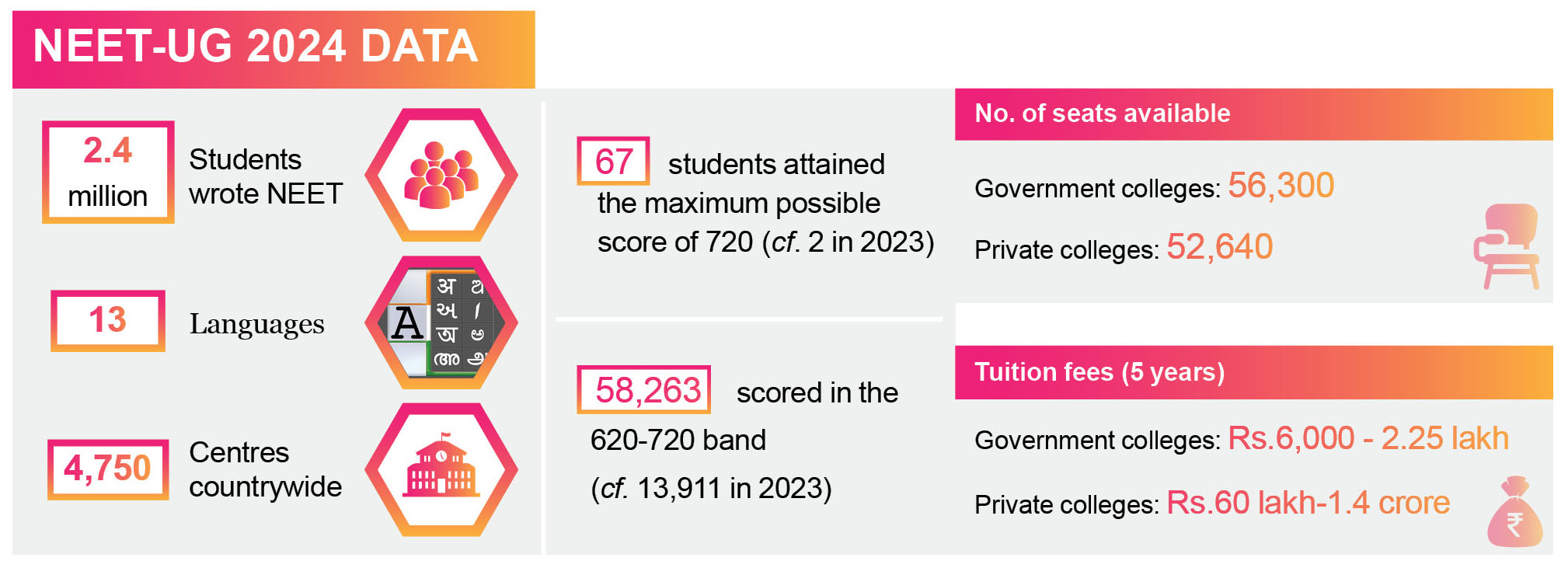 “Be it NTA or any top official or senior person in NTA, strict action will be taken against whoever is found guilty in the case. No malpractice will be tolerated and the government is committed to holding zero-error exams. The government has formed a high-level committee which will investigate several issues pertaining to the NTA. Recommendations will be expected from that high-level committee to further improve NTA, its structure, functioning, examination process, transparency, and data security protocol. I want to assure everyone that the government is committed to protecting the interests of students. We will not compromise on transparency,” said Pradhan.
“Be it NTA or any top official or senior person in NTA, strict action will be taken against whoever is found guilty in the case. No malpractice will be tolerated and the government is committed to holding zero-error exams. The government has formed a high-level committee which will investigate several issues pertaining to the NTA. Recommendations will be expected from that high-level committee to further improve NTA, its structure, functioning, examination process, transparency, and data security protocol. I want to assure everyone that the government is committed to protecting the interests of students. We will not compromise on transparency,” said Pradhan.
But the minister’s assurances provide little comfort to the 2.4 million school-leavers who had swotted for months preparing for this public exam which is the gateway for admission into the country’s prized 706 medical colleges, in particular 389 government colleges offering highly subsidised medical education. Students’ demonstrations are swelling in major cities and towns and parents are banding to file a spate of new writ petitions for and against cancellation of NEET-UG 2024, even as new revelations of question paper leakages and special pre-exam classes having been held in Bihar, UP and Gujarat for students who paid Rs.30-40 lakh for leaked question papers, are hitting newspaper headlines every day.
“It’s shocking that the NTA has mismanaged such a high stakes examination affecting over 2.4 million school-leavers. It completely disregarded earlier warnings in May of a question paper leak, and even after students pointed out gross anomalies in NEET-UG 2024 results, it failed to accept responsibility. Only after writ petitions were filed in the Supreme Court, NTA admitted to awarding grace marks to over 1,500 students. Cancelling these grace marks is of no help to students and their parents who have made huge sacrifices to prepare for NEET. This grades inflation has left the majority of students in the lurch, with admission cut-offs having hit the roof. NTA has no answers also to centre fixing allegations — why were students from Odisha and Madhya Pradesh allotted test centers in Godhra, Gujarat, and not their home states?” queries Dr. Vivek Pandey, a Madhya Pradesh-based social-political and RTI activist and whistleblower, who is assisting several NEET-UG students to file writ petitions in the courts.
According to Pandey, an RTI application he filed in 2022 revealed that NTA conducts 42 national exams with just 426 employees. “This shows that NTA relies heavily on outsourcing its work. These outsiders could be involved in leaking question papers. Moreover, what is NTA’s explanation for massive grades inflation this year? Sadly, corruption has seeped into the highest levels of education. Government needs to go beyond ritual cleansing of NTA to restore parents and students’ faith in NEET and other exams,” adds Pandey.
The fallout of grades inflation in NEET-UG 2024 is of enormous proportions. In previous years, all students with NEET scores of 640-720 would have been ranked among top 10,000 qualifying them for admission into a highly-subsidised government medical college of their choice. This year, a student with a similar score is ranked in the top 30,000-40,000 which rules out admission in a government college of their choice.
Moreover in 2023, only 13,911 (0.6 percent) of the 2.3 million students who wrote NEET secured marks in the 620-720 band. However, in NEET-UG 2024, the number of students in this score band has jumped four-fold to 58,263 (2.3 percent). Therefore the admission cut-off of government medical colleges has risen from 610 to 650, disqualifying 30,000 students who would have qualified for admission into low–priced government colleges but for suspicious grades inflation.
Gaurav Tyagi, founder-director of Career Xpert, a Noida-based firm which provides medical college admission counseling to NEET-UG and NEET-PG aspirants, says that unusually high scores in NEET-UG 2024 have intensified “already cut-throat competition for MBBS (undergrad) seats.”
“Students in the 620-720 band who would have had no trouble getting admission into a top-ranked government medical college of choice will have to accept admission into second and third choice colleges often far from home. Alternatively they will have to sign up with private medical colleges which will multiply their cost of education. Some students may decide to take a year off to prepare for NEET 2025. Indeed, this is a cheaper option than signing up with private colleges. I also expect a rise in the number of Indian students enrolling with medical colleges in the Philippines, China, Russia, Georgia and Ukraine. In India, the five-year MBBS course in a private medical college costs Rs.60 lakh-1.4 crore as against Rs.25-40 lakh in Georgia and the Philippines. Moreover, all this is likely to increase dependence on coaching schools which will see a surge in enrollment as students look to improve their scores next year,” says Tyagi.
Curiously, although India hosts the largest number of medical colleges worldwide (706), they offer a mere 108,940 seats — 56,300 in government and 52,640 in private colleges — annually for undergrad (MBBS) medical education. Conversely, China’s 420 colleges provide 286,000 seats. This paradox is because of government rules adopted by the National Medical Commission (NMC, estb.2020), the successor medical education and practice regulatory body of the scandal-tainted Medical Council of India, which mandate that every medical college should have an “attached” hospital.
Preconditions for establishment of a medical college include minimum 20 acres of land (relaxed to 10 acres in metros) and a 300-bed attached fully equipped hospital, which should have been functional for at least two years at the time of application for registering a new medical college. Moreover, NMC rules mandate differing size attached hospitals for colleges with larger student numbers. These complex administrative requirements drive up cost of promoting greenfield medical colleges, and eventually tuition fees.
Dr. Devi Shetty, renowned cardiologist and chairman of Narayana Health City, Bengaluru, is highly critical of these preconditions for promoting medical colleges. “In India, it costs at least Rs.400 crore to build a medical college. In the Caribbean, 35 medical colleges are training doctors for the US in 50,000 sq. ft rented premises in shopping malls with students interning with public hospitals. In India, we have made medical education an elitist affair… this country requires liberation of medical, nursing and paramedical education from burdensome official regulation,” says Dr. Shetty. (See www.youtube.com/watch?v=IuMCGjjwyRI).
An over-regulated medical education system and middle class aspiration for the prized medical degree have coalesced to create, drive and sustain the Rs.58,000 crore test prep aka coaching industry. Millions of dazed school-leavers are herded into offline and online coaching classes where they swot to make it into the rank of top 56,000 students admitted into government medical colleges annually. In Kota, the epicenter of India’s tests-prep coaching industry, over 300 coaching schools drill and skill an estimated 2.5 lakh students annually for the NEET-UG exam. Under extreme pressure to be ranked among the Top 56,000, dozens end their lives by suicide. In 2023, 27 students resorted to suicide in Kota — the largest number ever.
According to monitors of the education system, transformation of NEET-UG into a centralized high-stakes single annual exam is rooted in widespread distrust of education standards of state governments. Before introduction of NEET-UG in 2016, every state government conducted its own common entrance test (CET) for admission into government and private medical colleges (also engineering and other professional colleges) within their jurisdiction. However, with some students complaining that they had to incur the expense and inconvenience of travelling to write entrance exams of different states and worry about clash of exam dates, in 2016, the Supreme Court ruled that a Central NEET-UG written annually countrywide is a preferable undergraduates admissions exam.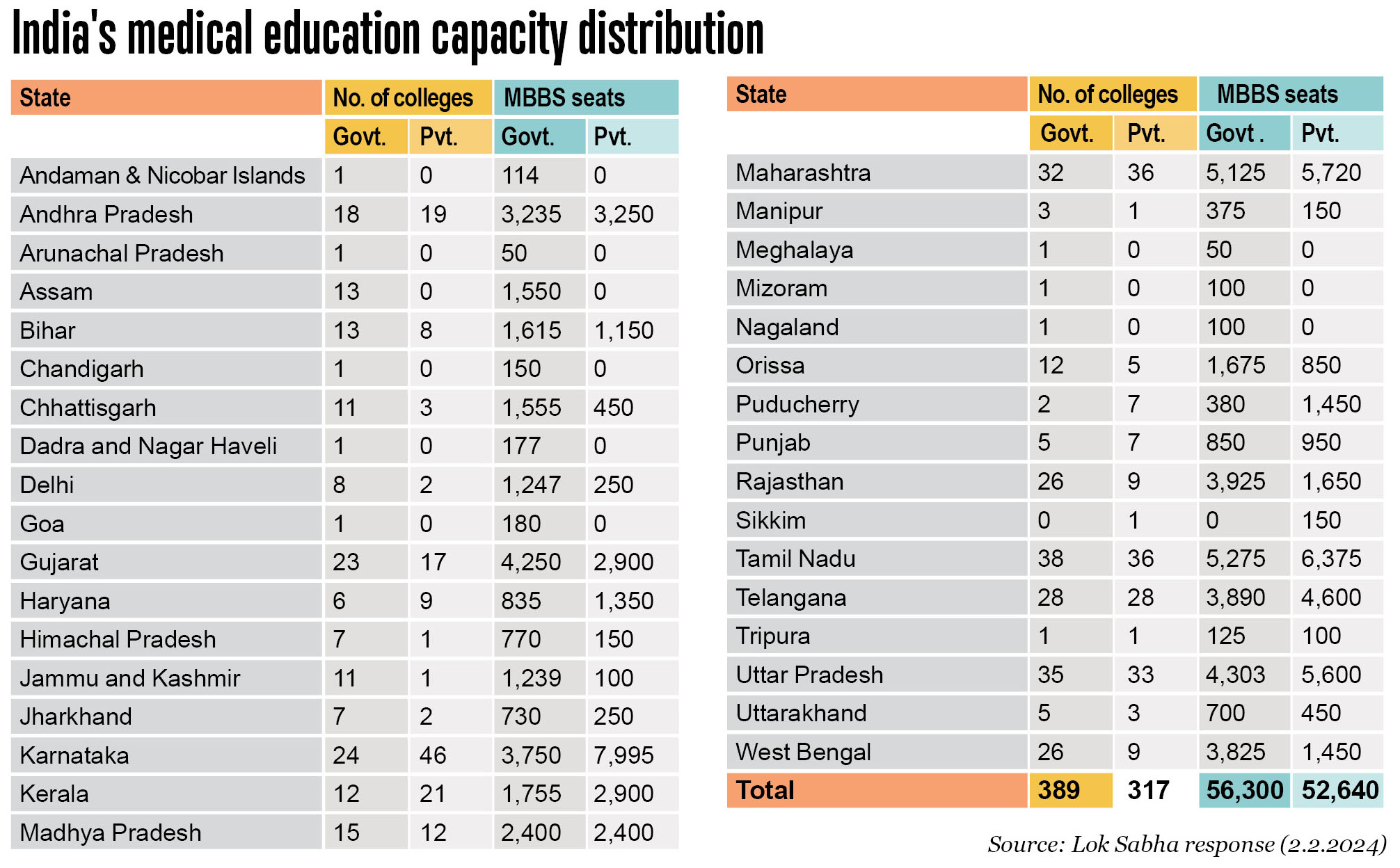 Subsequently, the inaugural NEET-UG was conducted in 2016 by the Delhi-based Central Board of Secondary Examination (CBSE), the country’s largest school-leaving examination board with 29,662 affiliated schools. The following year (2017), the BJP-led NDA government established the National Testing Agency (NTA) as “a premier, specialist, autonomous and self-sustained testing organisation to conduct entrance examinations for admission/fellowship in higher educational institutions”. It was tasked with conducting 42 national exams including the IIT-JEE, NEET-UG, UGC-NET, among others.
Subsequently, the inaugural NEET-UG was conducted in 2016 by the Delhi-based Central Board of Secondary Examination (CBSE), the country’s largest school-leaving examination board with 29,662 affiliated schools. The following year (2017), the BJP-led NDA government established the National Testing Agency (NTA) as “a premier, specialist, autonomous and self-sustained testing organisation to conduct entrance examinations for admission/fellowship in higher educational institutions”. It was tasked with conducting 42 national exams including the IIT-JEE, NEET-UG, UGC-NET, among others.
However despite NTA’s several gaffes since 2017 when it was established, some informed monitors of India’s obsolete education system advise patience with centralised exams and NTA. “NTA is a young organisation and as the recent NEET-UG exam debacle shows, it has much to learn. Fair and error-free testing at scale is possible only when exam processes and systems are refined to extremely high quality standards. Unfortunately, NTA has not invested sufficiently in establishing fool-proof processes and systems, and more fundamentally in building assessments capacity. It needs to seriously develop a cadre of professionals trained and skilled in the science of assessment, assessment design, scaled examinations, examination operations, testing for skills versus testing for knowledge, and standardisation practices using advanced statistics. Moreover, NTA has under-utilised technology which can be effectively used to ensure greater transparency in the examination process,” says Meeta Sengupta, an IIM-Ahmedabad alumna and a Delhi-based education advisor and mentor on leadership, governance, education and skills.
Unsurprisingly, NTA’s big NEET-UG 2024 mess has resurrected demands from several non-BJP ruled states including Karnataka, West Bengal and Tamil Nadu, to return to pre-2016 position with state governments conducting medical college entrance examinations. The most vocal demand for scrapping NEET is from Tamil Nadu which ab initio opposed the introduction of this national entrance exam. All major political parties — especially the ruling DMK and opposition All India Anna Dravida Munnetra Kazhagam (AIADMK) — have vehemently opposed NEET on the ground that students from government, especially rural, schools suffer severe disadvantage in writing NEET because they can’t afford test prep/coaching school drilling and skilling.
On more than one occasion the state’s legislative assembly has passed resolutions demanding NEET exemption for Tamil Nadu, arguing that a single qualifying national test violates federalism and social justice. On September 13, 2021, the assembly passed the Tamil Nadu Under Graduate Medical College Degree Courses Bill, 2021, exempting school-leavers from the state from writing NEET. However, the Bill is pending approval of President Draupadi Murmu, who is obliged to act on the advice of the Central government.
On June 23, Tamil Nadu chief minister M.K. Stalin posted on X (twitter) that the NEET-UG scam and cancellation of UGC-NET are “final nails in the coffin of an incompetent and broken system of centralised selection”. He called for a national consensus to stipulate higher secondary exam marks as criteria for admission into medical colleges in every state. “As this scam unravels, let us plan for a better future and join our hands for building a fair and equitable selection process for professional courses, ensuring the primacy of school education and making it the base for careers (and) restoring the rights of States to determine their selection process for professional courses,” he tweeted.
But although the causes of social justice and inclusivity may be served by the TN government’s contention, the ground zero reality is that with 67 school exam boards operational across the country, there are wide variations in education quality and assessment standards. Medical education experts argue that non-standardisation and wide variation in scores awarded by state boards necessitates a common pan-India test for aspiring medical practitioners.
“The current NEET crisis is symptomatic of a failed state that is unable to ensure high-quality school education. Like in most countries, standardised schooling of good quality enables admission to colleges based on marks obtained in the final school examination. But in India, since standards are so varied and quality not assured, examinations for most professional courses are centralised. Due to the tough competition, committing irregularities for monetary gains becomes a great incentive. Clearly, the long-term solution is improving schooling quality, decentralising examinations, and institutionalising strict oversight and governance to restore confidence and credibility. Till that is done, the leakage of papers will continue to plague us,” writes K. Sujatha Rao, former Union health secretary, Government of India in the Indian Express (June 21).
Given the mad annual scramble for admission into a limited number of good quality, top-ranked HEIs, scams, scandals and question paper leakages are also ubiquitous in state-level exams. But the scale of their impact is limited. For instance in the eastern state of West Bengal, the Teacher Eligibility Test (TET) exam for recruitment of government school teachers has been a running scandal since 2012 with a spate of petitions filed in the Calcutta high court alleging irregularities and corruption in annual TET exams. In July 2022, the CBI arrested the ruling TMC government’s education minister Partha Chatterjee after a huge stash of Rs.100 crore in bank notes was found in the flat of his mistress. Similar exam scams plague most states of the country. The outcome of continuous and uninterrupted corruption in public exams is that it has eroded public faith and trust in the larger system.
Highly respected public intellectual Dr. Pratap Bhanu Mehta, a former vice chancellor of the top-ranked private Ashoka University, warns that the adverse impact of centralised national exams such as NEET-UG could erode public faith in the democratic system of governance. “Exams function as a legitimating ideology in a system marked by extreme scarcity. The more relative scarcity we produce, by failing to create more and better institutions, by failing to create jobs, the more the stakes in the exam system. So a collapse in trust in the exam system is tantamount to a collapse in trust in the system as a whole,” warns Mehta in The Indian Express (June 25).
Unprecedented middle class anger against the shame and scandals in NEET-UG 2024 emerging everyday has become a huge embarrassment for the newly sworn-in Modi-led NDA 3.0 government, which in its General Election 2024 campaign had highlighted corruption-free governance as its biggest achievement of a decade in office at the Centre. After initially denying charges of negligence, nepotism and hasty establishment of NTA, Union education minister Dharmendra Pradhan has gone into full damage control mode. He sacked NTA chief Subodh Kumar and appointed retired IAS officer Pradeep Singh Kharola as the new Director-General; ordered a CBI inquiry into the scam; and constituted a high-level seven-member committee under the chairmanship of Dr. K. Radhakrishnan, former chairman, ISRO and chairman Board of Governors, IIT-Kanpur, to “improve functioning of NTA and ensure transparent, smooth and fair conduct of examinations”.
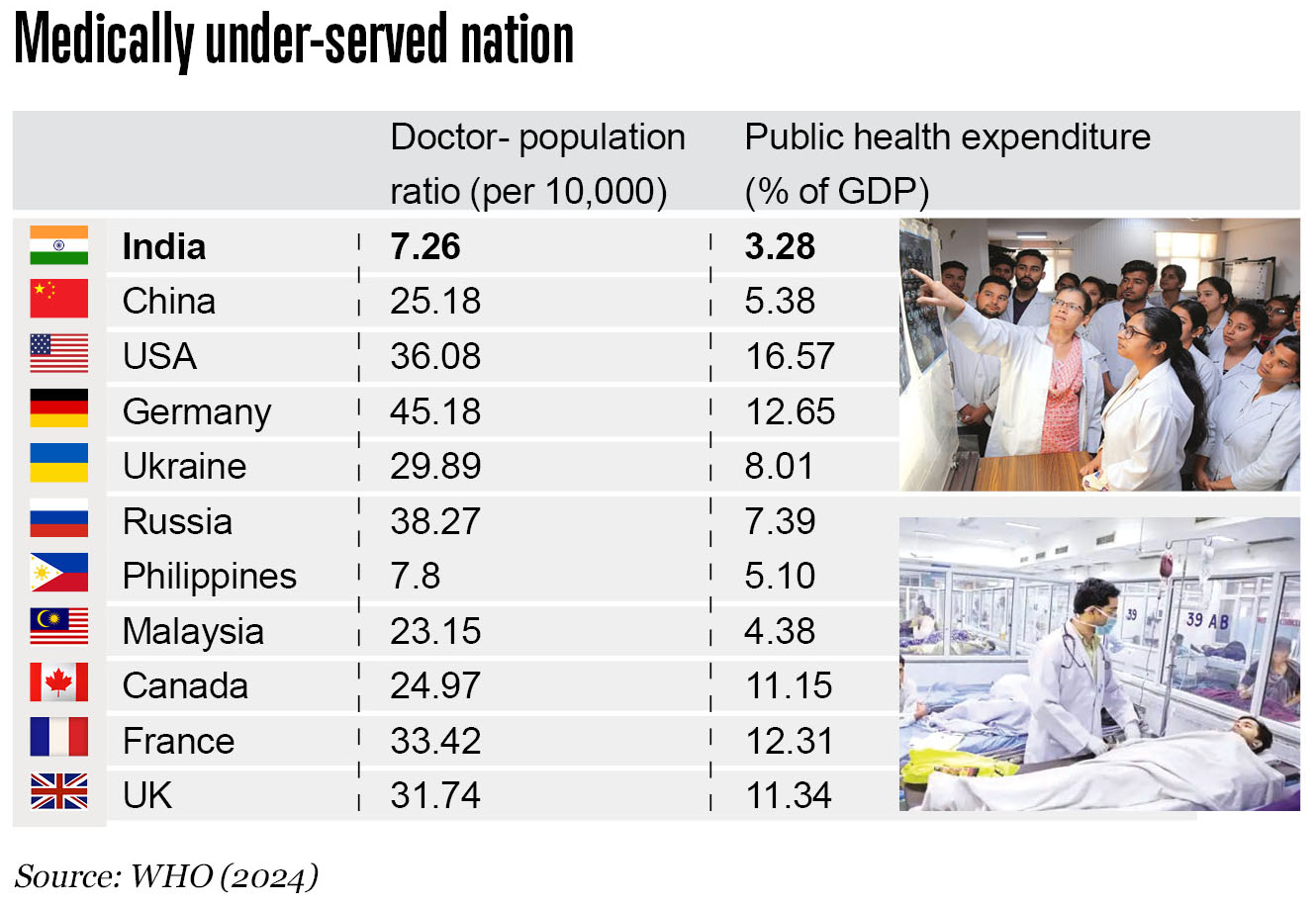 Moreover on June 21, the BJP-led NDA government notified the Public Examinations (Prevention of Unfair Means) Act 2024. The Act mandates stringent penalties for those found guilty of exam malpractices including a minimum jail term of three years, extendable to five years, plus a fine of up to Rs.10 lakh for individuals involved in leaking question papers or tampering with answer sheets. Service providers involved in public exam frauds can be fined up to Rs.1 crore and sentenced to five-10 years in prison for malfeasance.
Moreover on June 21, the BJP-led NDA government notified the Public Examinations (Prevention of Unfair Means) Act 2024. The Act mandates stringent penalties for those found guilty of exam malpractices including a minimum jail term of three years, extendable to five years, plus a fine of up to Rs.10 lakh for individuals involved in leaking question papers or tampering with answer sheets. Service providers involved in public exam frauds can be fined up to Rs.1 crore and sentenced to five-10 years in prison for malfeasance.
“This Act was much-needed and welcome. But its effectiveness will be determined by speedy implementation and speedy convictions. The police and judiciary have to exhibit speed and alacrity in bringing anti-socials accused of exam paper leaks and other malpractices to justice. Otherwise the new Act will merely add to the long list of proforma legislation,” says Dr. Brajesh Kumar Tiwari, associate professor at Atal Bihari Vajpayee School of Management and Entrepreneurship, Jawaharlal Nehru University, Delhi.
Meanwhile, the newly-constituted K. Radhakrishnan committee has begun consultations with students, parents, assessment and cyber-security experts, and in its first meeting held on June 25 reiterated that its top priority is to “quickly establish a robust tamper-proof exam system”. Informed sources indicate that the NTA is likely to introduce a multiple-times-a-year computer-based test (CBT) format for NEET and other national entrance exams, similar to SAT (Scholastic Aptitude Test) conducted by the US-based Educational Testing Service (ETS) for admission into higher education institutions in America.
Also under consideration is “collaboration” with ETS — the world’s largest private educational testing and measurement organisation which administers more than 50 million tests in 180 countries annually. The ETS administered MCAT (Medical Common Admission Test) — for admission into medical schools in the US — is a CBT test offered 25 times per year.
Union education minister Dharmendra Pradhan has hinted that a switch to SAT-like multiple tests may happen sooner than later: “India needs a flexible and less stressful exam system like SAT, the admission test for colleges in the US,” he said in a media interview.
Although several state governments — especially Tamil Nadu’s DMK government — have demanded cancellation of NEET and other national exams for admission into HEIs, most knowledgeable academics and monitors of Indian education favour national exams for admission into institutes of professional education — medicine, law, engineering — to safeguard against wide variations in assessment standards of state exam boards. This would ensure a level playing field for all school-leavers competing for much-too-few seats in institutes of professional education. Moreover, common entrance tests such as NEET-UG ensure that only the brightest and best are able to derive the full benefit of a highly-subsidised state provided medical education.
While greater use of technology, overhauling and institutionalising best assessment practices and SOPs (standard operating procedures) and according constitutional status to NTA are undoubtedly operational solutions to plug loopholes in the country’s public exam systems, the critical requirement is to expand capacity through deregulation and liberalisation of higher education since the Central and most state governments run fiscal deficits.
In particular, the irrational stipulation that every medical college must necessarily have a graded capacity attached hospital needs to be scrapped. This stipulation sky-rockets the cost of promoting medical colleges manifold, and in turn, drives up tuition fees. There’s no rational reason why medical colleges cannot enter into bilateral agreements with local public and private hospitals to provide students interning experience.
Yet the major infirmity of the Indian education system is that it is severely under-funded. It’s shocking that India with a population of 1.4 billion offers a mere 108,940 medical college seats per year (cf. China’s 286,000 seats).
“A common suggestion to address the ongoing NEET controversy is to improve the functioning of NTA. However, merely enhancing the NTA’s capabilities is unlikely to solve the fundamental problem of scarcity of educational institutions and the intense competition for limited seats. This scarcity drives the demand for test prep services and fuels the high-pressure environment that leads to unethical practices. We need to liberally build and enhance educational institutions across the country — India needs two world-class universities in every district. Of course this is easier said than done, but we must start somewhere. The stakes are too high to delay any further,” says Atul Khosla, Vice Chancellor of Shoolini University, Himachal Pradesh (estb.2009) ranked #1 in the state in the EW India Private University Rankings 2024-25.
Yet expanding capacity in medical and higher education in general requires greater investment in public education, a proposition that your editors have been advancing for 25 years. Way back in 1967 the high-powered Kothari Commission recommended annual expenditure in public education (Centre plus states) equivalent to 6 percent of GDP. Despite the election manifestos of every major political party routinely promising to implement this recommendation, the promise has been practiced more in the breach than observance. For over seven decades annual expenditure for public education has averaged 3.5 percent of GDP. Consequently, 21st century India hosts 300 million adult illiterates, public K-12 education is in a shambles and GER (gross enrollment ratio) in higher education is 27 percent cf. 85 percent in South Korea.
The scale and impact of the NEET-UG 2024 contretemps has again highlighted the sustained neglect of education and human resource development by successive administrations and the establishment. The NEET-UG scandal is the inevitable outcome of this national blindspot. It has shaken the faith and trust of students, parents and teachers communities in the country’s education system which has a long history of public exam malpractices because of capacity shortage across the spectrum.
Restoring this massive loss of faith requires more than band-aid solutions from the new BJP-led NDA 3.0 government which has begun its new shaky innings on the backfoot.





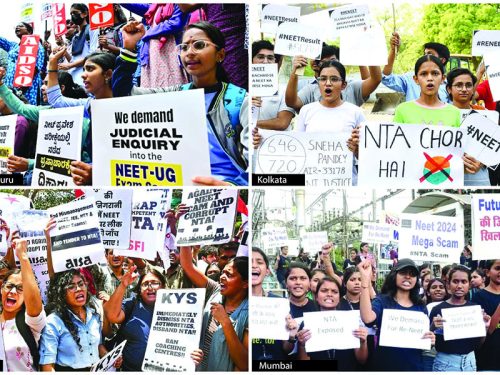

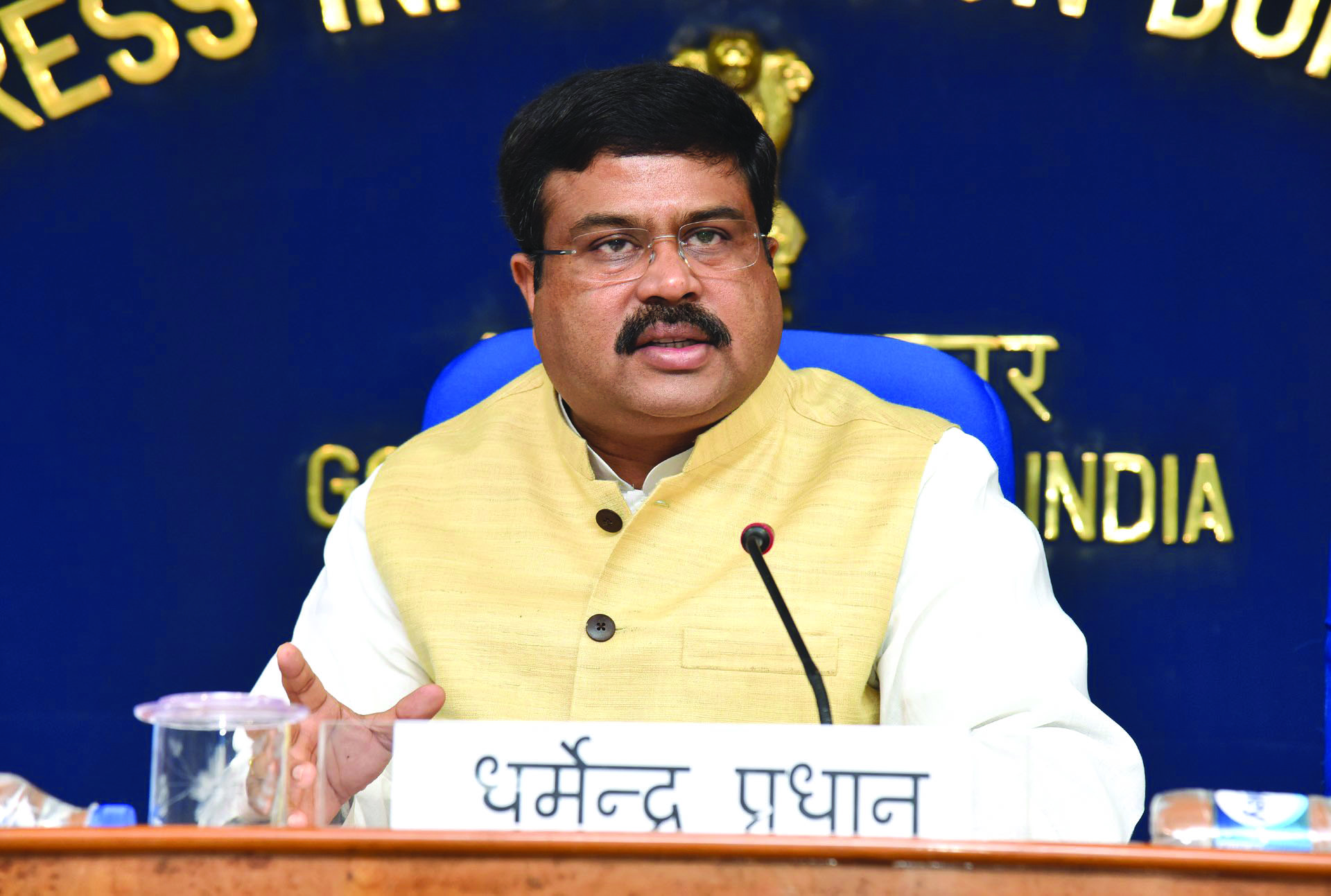
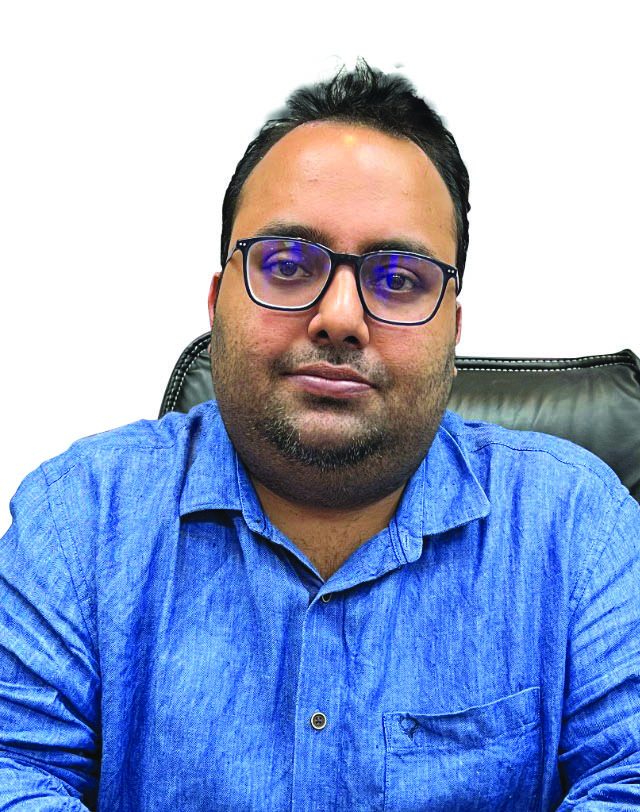
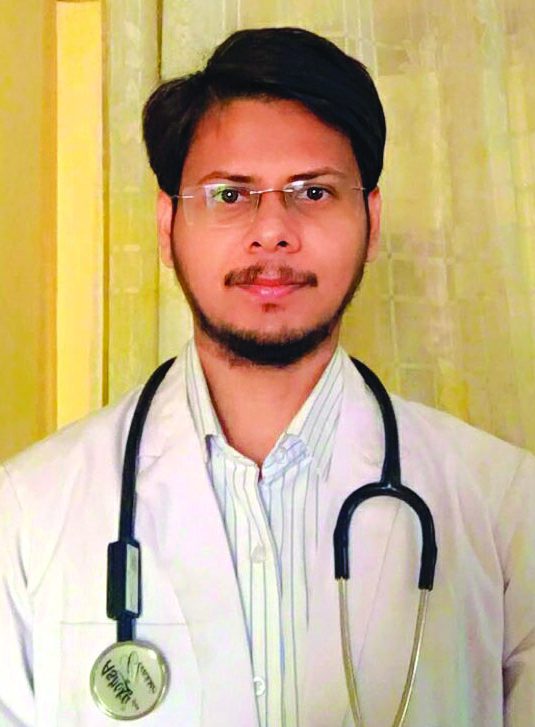

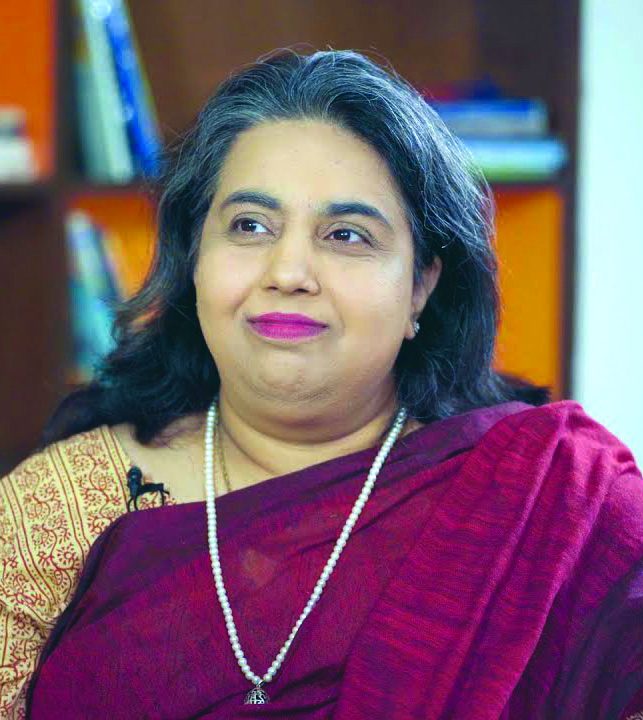
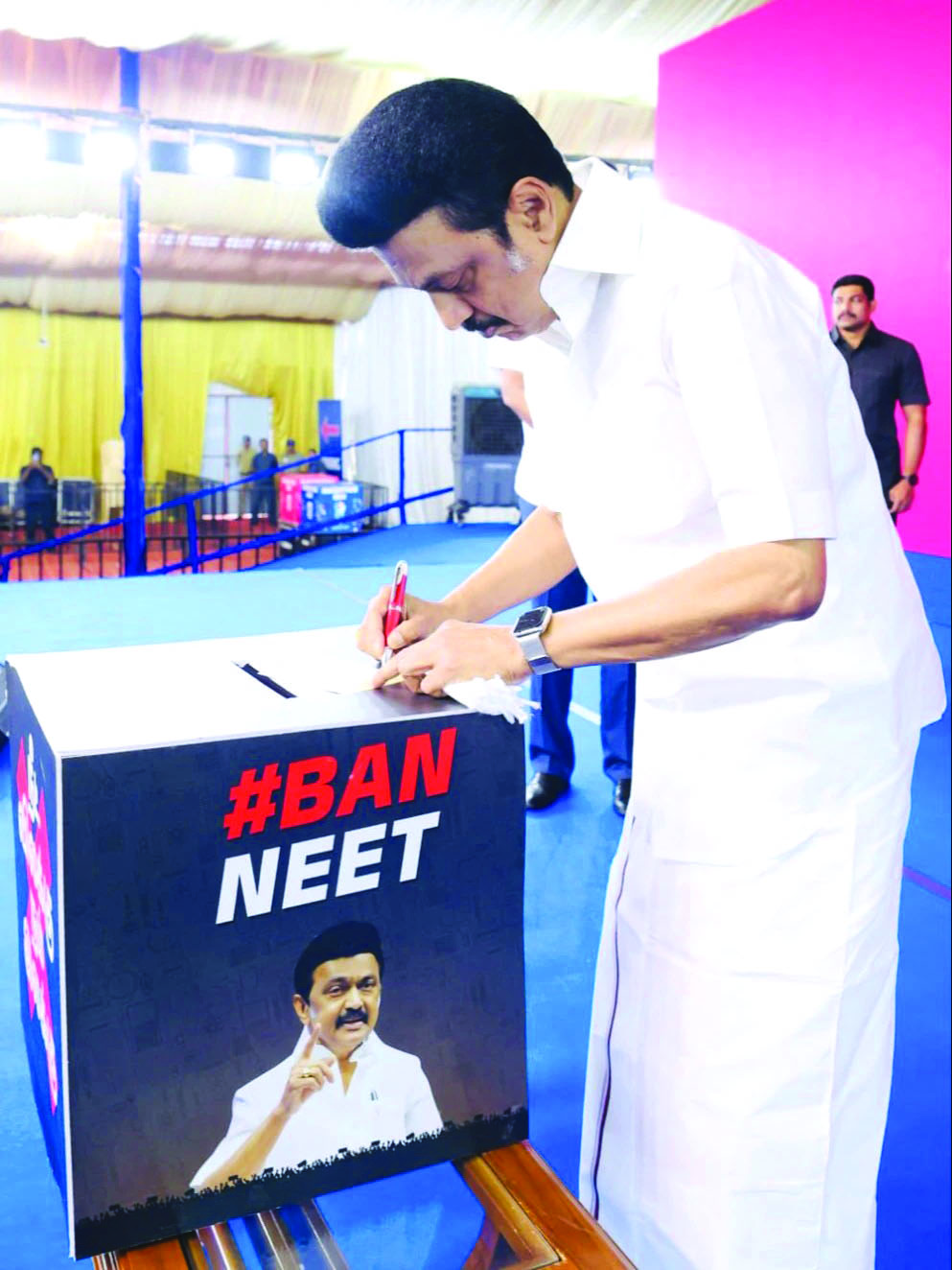
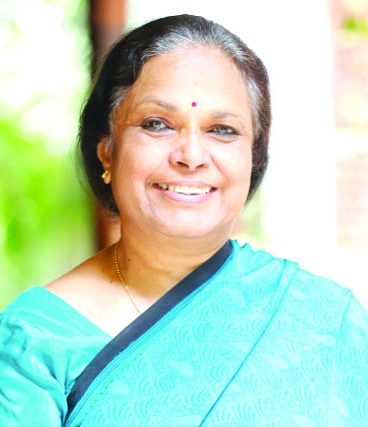
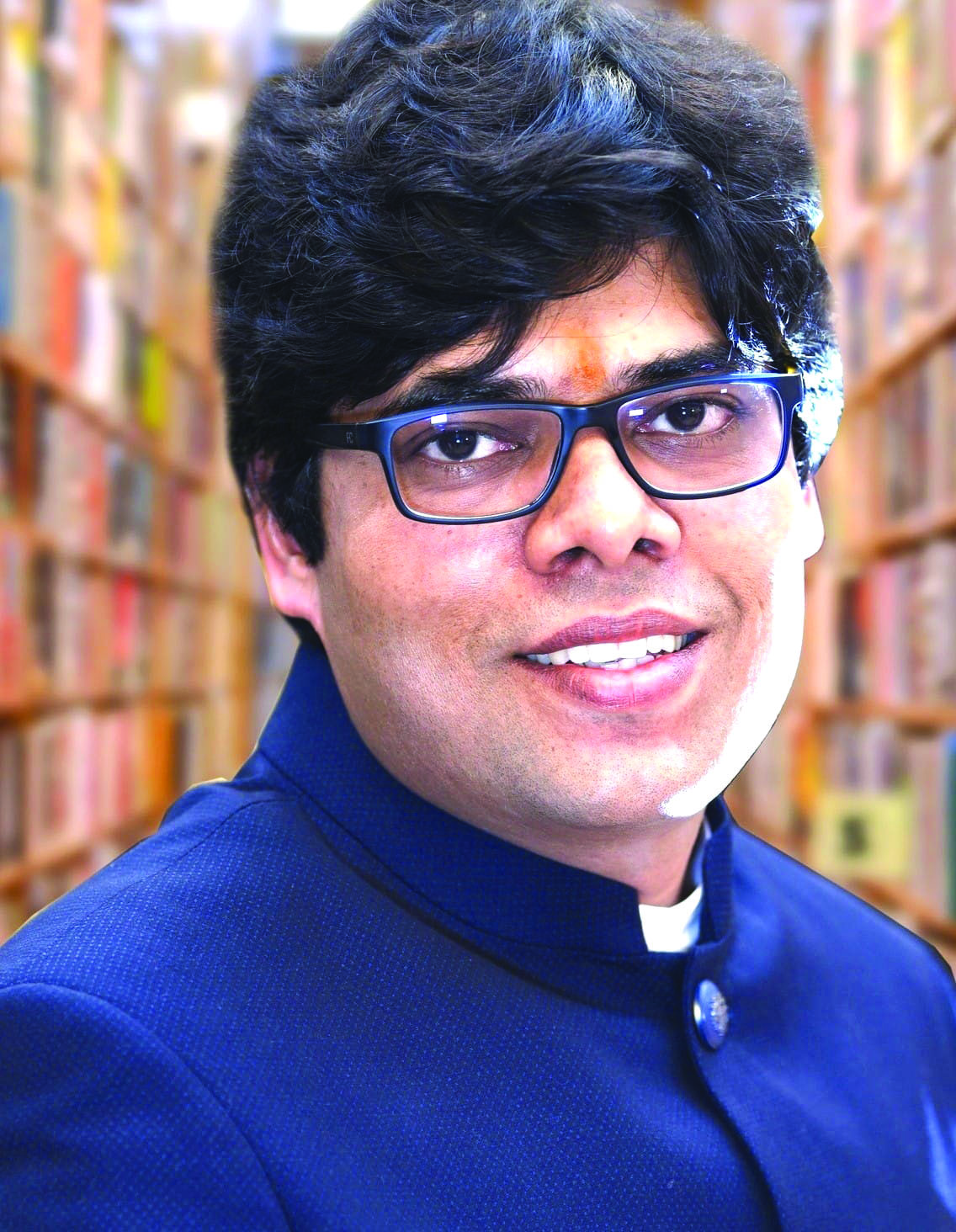
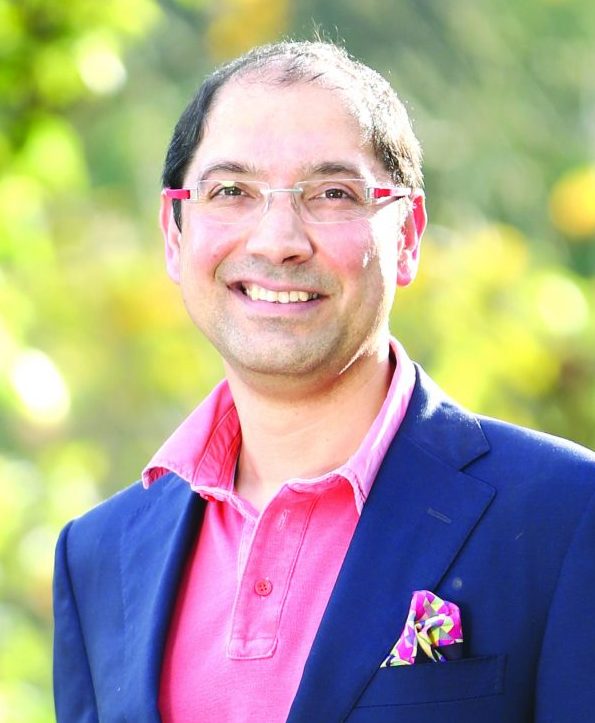











Add comment